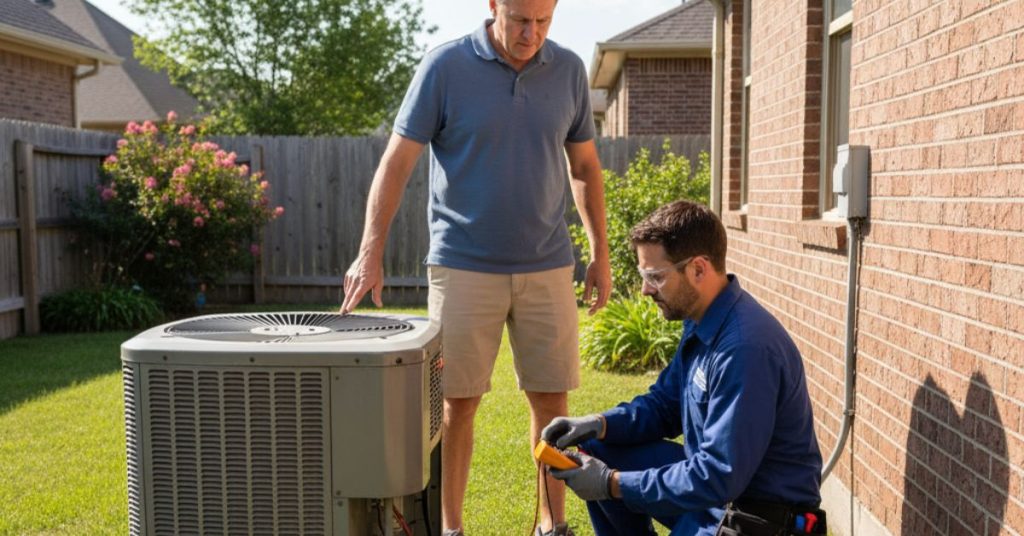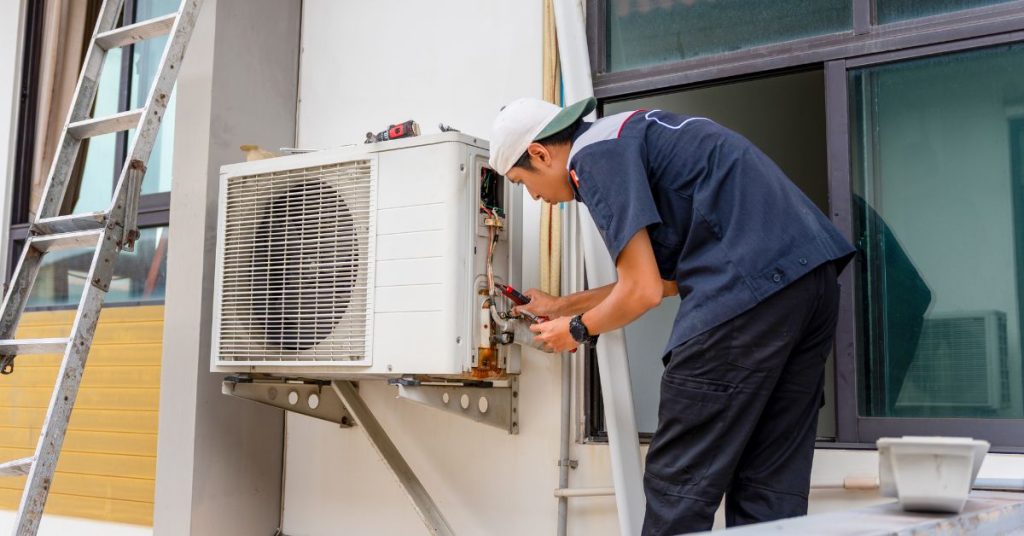Table of Contents
An AC condenser leaking water often results from clogged drain lines, frozen coils, or low refrigerant. Prompt maintenance and professional inspection can prevent damage and restore system efficiency.
Key Takeaways:
- Clogged drain lines cause leaks
- Frozen coils indicate airflow issues
- Low refrigerant impacts cooling
- Regular maintenance prevents damage
An air conditioning condenser leaking water is one of the most common issues homeowners face during warm months. While a small amount of condensation is normal, excessive water leakage often signals underlying problems that require immediate attention. Understanding the causes of AC condenser leaks and learning the best fixes can save you from costly repairs and ensure your cooling system works efficiently.
How the AC Condenser Works

The AC condenser is a critical component of your cooling system, located outdoors and plays a vital role in removing heat from your home. It works by transferring the heat collected indoors to the outside air, ensuring your living space stays cool and comfortable. As part of this process, condensation naturally occurs when warm air meets the cooled coils of the condenser.
However, if the drainage system becomes clogged or the refrigerant cycle is disrupted, you may notice water pooling around your AC condenser unit. This can indicate potential problems such as blocked drain lines, dirty coils, or refrigerant issues that require timely maintenance. Regular inspection helps prevent costly repairs and ensures efficient system performance.
Common Causes of AC Condenser Leaking Water
1. Clogged Condensate Drain Line
A blocked condensate drain line is a common cause of AC water leaks. This line removes moisture collected during the cooling process, but over time, it can become clogged with algae, dirt, or debris. When blocked, water can’t drain properly and begins to back up, eventually leaking around the indoor unit. Left unchecked, it may cause water damage to your home and reduce AC efficiency.
Fix: Use a wet/dry vacuum to remove the clog or flush the line with vinegar to dissolve buildup. Prevent future blockages with annual professional AC maintenance, ensuring optimal system performance.
2. Dirty Air Filters
When air filters are clogged with dust and debris, they restrict airflow, which can cause the evaporator coils to freeze. As the coils freeze, ice builds up on their surface. When the system turns off and the ice melts, it produces excess water that drains into the condensate pan. If the volume is too high or drainage is slow, the pan can overflow, leading to water leaks near the indoor unit.
Fix: Replace or clean air filters every 30–60 days to maintain proper airflow, improve efficiency, and reduce the risk of leaks and frozen coils in your AC system.
3. Low Refrigerant Levels
Insufficient refrigerant can cause low pressure inside the system, leading to coil freezing. When the refrigerant level drops, the evaporator coils become too cold and freeze over. As the ice eventually melts, the resulting water can overflow the condensate pan and leak around the condenser unit. This not only creates water damage but also reduces cooling efficiency and strains the compressor.
Fix: A certified HVAC technician should inspect the system for leaks, repair any damage, and safely recharge the refrigerant to the correct level. As per the EPA’s Section 608 guidelines, only licensed professionals are permitted to handle refrigerants due to safety and environmental regulations.
4. Damaged or Rusted Drain Pan
The condenser fan pulls air across the condenser coils to help release heat. A malfunctioning fan can cause overheating and eventual system failure. For proper care:
- Inspect the fan blades regularly for cracks, bending, or signs of wear that affect performance.
- Ensure the condenser fan motor is properly lubricated (if required) to reduce friction and overheating.
- Listen carefully for unusual noises like grinding or rattling that may indicate motor or bearing issues.
If the fan fails to operate efficiently, the condenser will not cool effectively, leading to overheating and breakdowns.
5. Improper AC Installation
If the AC condenser is not level, water may not flow correctly into the drain line. When the unit is tilted or installed unevenly, gravity can’t guide the condensate water into the drain pan and out through the line as intended. Instead, water may pool in the wrong areas, eventually overflowing and causing leaks around the system. Improper installation can also lead to increased wear on components and reduced energy efficiency.
Fix: Ensure the AC unit is positioned on a stable, level surface. If the unit appears uneven, hire a professional technician to correct the installation and prevent future issues.
6. Excessive Humidity
High humidity levels naturally increase condensation in the system. If the drainage system cannot handle the extra moisture, you may notice water pooling near the condenser. In humid environments, the air conditioner must remove more moisture from the air, leading to a higher volume of condensate. When the condensate pan or drain line becomes overwhelmed, it can cause leaks and water damage around the unit. Excessive humidity also makes the AC work harder, reducing efficiency.
Fix: Install a dehumidifier or ensure your AC system is correctly sized to handle humidity in your region.
7. Broken Condensate Pump
Homes with AC units located in basements or low areas often use a condensate pump to move water outside. This pump helps push collected condensation upward and out of the home when gravity drainage isn’t possible. If the pump becomes clogged, loses power, or fails mechanically, it can no longer remove water effectively. As a result, water backs up in the system and begins to leak around the unit, potentially causing damage to floors and walls.
Fix: Have a technician inspect the condensate pump. Repair or replace it promptly to restore proper drainage and prevent recurring leaks in low-level installations.
Signs Your AC Condenser Leak Needs Urgent Attention
A leaking AC condenser can quickly escalate from a minor inconvenience to a major issue if not addressed promptly. Watch for these warning signs that indicate your system may need immediate professional attention.
- Unusual puddles around the outdoor unit
- Moldy smells from the AC vents
- Weak airflow or warmer air inside the home
- Hissing or bubbling noises, indicating refrigerant leaks
- Rising energy bills due to system inefficiency
- Frequent system cycling or unexpected shutdowns
- Visible rust or corrosion on or around the condenser unit
Ignoring these signs can result in serious system damage and high repair costs.
Step-by-Step Guide to Fixing AC Condenser Leaks
Step 1: Turn Off the System
Always disconnect power at the thermostat and breaker to ensure safety before inspecting or working on your AC unit.
Step 2: Check and Clean Air Filters
Dirty filters restrict airflow, causing coil freezing. Replace or clean them to restore efficiency and prevent future leaks or damage.
Step 3: Inspect the Drain Line
Use a wet/dry vacuum or pour vinegar into the line to remove clogs caused by dirt, algae, or mold buildup.

Step 4: Examine the Drain Pan
Check for cracks, rust, or shifting. A damaged or misaligned pan can leak water and damage nearby components or flooring.
Step 5: Assess Refrigerant Levels
Frozen coils or poor cooling may signal low refrigerant. Hire a licensed technician to test for leaks and recharge safely.
Step 6: Test the Condensate Pump
Pour water into the pump’s reservoir. If it doesn’t activate and drain properly, repair or replace the pump immediately.
Preventing Future AC Condenser Leaks
Proactive maintenance is key to preventing recurring problems. According to the U.S. Department of Energy, regular HVAC maintenance not only prevents breakdowns but also improves energy efficiency and extends system life.
Here are some preventive measures to protect your AC system:
- Schedule professional HVAC tune-ups annually to inspect and clean the system.
- Change filters regularly to prevent restricted airflow.
- Flush condensate lines every few months with vinegar to avoid algae buildup.
- Keep the area around the condenser clear of dirt, plants, and debris.
- Ensure proper installation and leveling of the unit for efficient drainage.
When to Call an HVAC Professional
While some issues like clogged drain lines or dirty filters are easy DIY fixes, other problems such as refrigerant leaks, damaged coils, or broken condensate pumps require professional expertise. These more complex problems involve handling refrigerants or intricate mechanical components, which need specialized tools and training to repair safely and effectively. Attempting to fix these yourself can worsen the damage or void warranties.
Ignoring water leaks from your AC system can lead to serious consequences, including electrical hazards, water damage to your home, and ultimately complete system failure. Calling an HVAC professional promptly ensures proper diagnosis and repair, protecting both your property and your comfort.
Who to Call for Professional HVAC Services
When your AC system needs expert attention, calling a trusted company like HVAC Alliance Experts ensures quality service and peace of mind. They specialize in ac repair, heating maintenance, air duct cleaning, as well as parts repair and installation, making them a one-stop solution for all your HVAC needs.
Choosing professionals like HVAC Alliance Experts guarantees that repairs and installations are done correctly and efficiently, helping to extend the life of your system and maintain a comfortable home year-round. Don’t settle for less—trust the experts.
Conclusion
An AC condenser leaking water is not something to ignore. What may start as a minor issue—like a clogged drain line or dirty air filter—can quickly escalate into costly water damage, reduced cooling efficiency, or even system failure. Regular maintenance and timely repairs are essential to keeping your HVAC system running smoothly and preventing leaks from disrupting your home comfort.
Whether it’s checking filters, flushing the drain line, or calling in a professional from HVAC Alliance Expert for more complex issues, staying proactive ensures long-term performance. Protect your investment—don’t wait until a small leak becomes a major problem.
FAQs
Yes, a small amount of condensation is normal when your AC runs. However, excessive pooling or continuous leaks usually indicate an underlying problem that needs attention.
Some issues, like clogged drain lines or dirty air filters, can be handled with DIY solutions. For refrigerant leaks, damaged parts, or pump failures, it’s best to call a licensed HVAC technician.
It’s recommended to flush the condensate drain line with vinegar every 2–3 months. This helps prevent algae, mold, and debris buildup that can cause water leaks.
Leaks inside usually mean the drain pan is damaged or the drain line is clogged. In some cases, frozen coils due to low refrigerant or dirty filters can also cause indoor leaks.
If you notice frozen coils, hissing noises, a broken condensate pump, or recurring leaks, contact an HVAC technician immediately. Professional service prevents costly repairs and ensures your system runs safely and efficiently.


